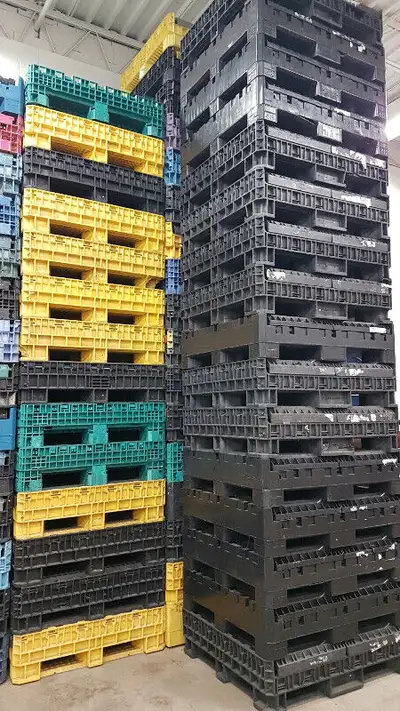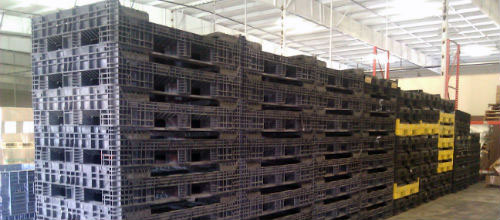Why Mass Containers Are Important for Lasting and Economical Transportation
Bulk containers play a crucial function in modern-day logistics. They assist in the effective activity of large quantities of goods, thereby optimizing transport procedures. This method not only reduces prices however also reduces ecological impact via lower exhausts and waste generation. As sectors look for more sustainable practices, the adoption of mass containers is becoming increasingly substantial. What effects does this shift hold for future logistics and supply chain management?

The Advantages of Making Use Of Mass Containers in Logistics
Bulk containers revolutionize logistics by enhancing performance and sustainability. These containers permit the transportation of big quantities of goods in a single journey, noticeably minimizing the variety of trips needed. This not only improves procedures however also reduces labor costs connected with handling, loading, and unloading. Furthermore, mass containers are created to maximize room utilization within transport lorries, ensuring that more products can be shipped simultaneously.
The standardization of bulk containers likewise streamlines the logistics procedure. With consistent dimensions, they can be conveniently piled and kept, resulting in enhanced storehouse administration. Moreover, bulk containers commonly include long lasting products that secure components from damages during transportation, thus lowering product loss and boosting total reliability. Consequently, businesses can experience enhanced supply chain performance, inevitably leading to raised success and customer satisfaction. This mix of elements makes bulk containers a vital property in contemporary logistics.
Ecological Influence: Minimizing Waste and Carbon Footprint
As industries increasingly focus on sustainability, the adoption of mass containers has emerged as a key method for lowering waste and decreasing carbon footprints. These containers minimize making use of packaging products, such as boxes and plastic, thereby significantly decreasing general waste generation. By settling shipments, bulk containers boost transportation performance, permitting more items to be transferred per journey. This decrease in journeys directly associates with lower greenhouse gas emissions, adding to a smaller sized carbon impact.
Furthermore, mass containers can often be reused or recycled, better mitigating environmental influence. The durability of these containers warranties they can endure several transportation cycles, minimizing the need for single-use alternatives. used collapsible bulk containers. By simplifying logistics and advertising reliable source use, bulk containers not just support sustainable practices yet likewise motivate markets to align with worldwide environmental goals. Inevitably, their implementation mirrors a commitment to environmental stewardship and accountable resource management
Cost Cost Savings: Just How Mass Containers Lower Transport Costs
While lots of firms seek means to improve their profits, the usage of mass containers provides a significant opportunity for reducing transportation expenses. Bulk containers maximize the volume of goods transferred, enabling companies to ship larger quantities at the same time. This effectiveness minimizes the variety of trips required, straight reducing fuel expenses and minimizing labor expenditures related to loading and dumping.
In addition, bulk containers often feature streamlined layouts that maximize space utilization within transportation lorries. This implies less empty spaces, bring about much more effective usage of offered ability. The longevity of bulk containers can lower the threat of product damage throughout transit, ensuring and minimizing losses that more items arrive intact.
Enhancing Supply Chain Efficiency With Bulk Storage Solutions
Bulk storage space services play a vital duty in improving supply chain performance by enhancing stock monitoring. By consolidating products right into fewer, bigger containers, organizations can substantially lower taking care of prices connected with frequent transfers and processing. This structured approach enables for much better tracking and management of inventory, eventually causing improved operational performance.
Streamlined Stock Administration
Effective stock management is essential for optimizing supply chain procedures, specifically when companies adopt bulk storage space solutions. These solutions enable organizations to maintain higher supply degrees while minimizing the frequency of replenishment. By consolidating materials into bulk containers, companies can enhance their stock procedures, minimizing the intricacy linked with tracking numerous smaller bundles. This technique promotes accurate stock matters and enhances forecasting accuracy, permitting more educated decision-making. Additionally, bulk storage space remedies streamline storage facility organization, making it easier to situate and accessibility items when needed. Consequently, organizations can achieve a more effective supply turn over rate, inevitably enhancing general supply chain performance and reducing the possibility of stockouts or overstock situations.

Decreased Handling Prices
The implementation of mass storage solutions not just streamlines inventory management however likewise significantly decreases dealing with costs throughout the supply chain. By settling materials into bulk containers, firms minimize the need for constant handling and transfer between different storage space and transportation systems. This approach reduces labor costs related to loading, unloading, and relocating smaller packages. Furthermore, bulk storage space lowers the regularity of shipments, leading to lower transport expenses and reduced gas usage. Therefore, companies can optimize their logistics operations, permitting for a much more reliable allocation of sources. Inevitably, decreased managing costs contribute to boosted overall supply chain performance, promoting a setting that click to read sustains both sustainability and economic practicality.

Convenience of Bulk Containers Across Different Industries
Although lots of industries have unique needs for transportation and storage space, bulk containers have emerged as a versatile service that meets a large range of requirements. These containers, ranging from big containers to specialized tanks, can accommodate varied materials, including liquids, granules, and powders. In the agricultural sector, mass containers promote the transport of fertilizers and grains, while the food and beverage industry utilizes them for active ingredients and completed items. The chemical market counts on mass containers for safely moving dangerous products, ensuring conformity with security laws. Furthermore, building and construction firms profit from mass containers for transferring accumulations and other materials. Their adaptability reaches numerous modes of transportation, including trains, ships, and trucks, enhancing logistical effectiveness. This adaptability not only enhances procedures across different fields yet likewise promotes sustainability by lowering product packaging waste and maximizing room en route. Bulk containers play a vital role in modern supply chain management.
Future Trends in Mass Container Use and Sustainability
The future of mass container use is progressively shaped by cutting-edge materials development that enhances sustainability. Furthermore, automation in logistics guarantees to enhance procedures, lowering waste and enhancing efficiency. Accepting round economy methods will certainly further transform exactly how bulk containers are created, used, and reused, cultivating an extra lasting transport landscape.
Ingenious Materials Growth
As industries increasingly focus on sustainability, cutting-edge materials development wholesale containers arises as a considerable element in boosting environmentally friendly transportation options. Researchers and suppliers are exploring eco-friendly plastics, recycled composites, and light-weight metals to minimize environmental influence. These products not just reduce waste but likewise enhance gas performance by decreasing the total weight of containers. Additionally, innovations in wise products, which can adapt to differing problems, boost the sturdiness and capability of mass containers. The assimilation of these ingenious materials aligns with round economy concepts, promoting reuse and recycling. As the demand for sustainable techniques grows, the development of such materials will certainly play an important function in shaping the future of bulk container usage in logistics and transportation.
Automation in Logistics
Substantial developments in automation are positioned to transform logistics and the utilization of mass containers, enhancing sustainability in transportation. Automated systems, including drones and autonomous vehicles, are simplifying the activity of mass containers, lowering the reliance on standard fuel-powered transport. These technologies optimize directing and packing processes, reducing vacant miles and enhancing fuel efficiency. Furthermore, automated supply monitoring systems enhance monitoring and tracking of mass containers, ensuring better resource appropriation and decreased waste. The combination of the Web of Things (IoT) allows real-time information analysis, allowing proactive decision-making that lines up with sustainability objectives. As automation continues to evolve, it is anticipated to drive further advancements wholesale container usage, inevitably supporting more sustainable logistics methods and lowering the environmental impact of transport.
Circular Economic Situation Practices
Developments in automation are setting the stage for an extra incorporated method to circular economic situation methods in the domain of mass container usage. As sectors significantly welcome sustainability, bulk containers are being developed for durability and reusability. This change not only lessens waste however additionally enhances source effectiveness. Business are taking on methods such as closed-loop systems, where utilized containers are gathered, refurbished, and reestablished into the supply chain. Furthermore, smart modern technologies track container life process, assisting in better administration and lowering ecological impact. The cooperation between makers, logistics carriers, and end-users is crucial in developing requirements for lasting container usage. used collapsible bulk containers. Future trends suggest a growing emphasis on products that are recyclable and biodegradable, more strengthening the circular economic situation's concepts wholesale transportation

Frequently Asked Inquiries
What Materials Are Bulk Containers Normally Made From?
Bulk containers are usually created from resilient materials such as high-density polyethylene, steel, aluminum, and cardboard. These products supply strength, convenience, and defense, making them appropriate for delivering numerous items in various industries efficiently.
Exactly how Do I Select the Right Size Bulk Container?
Choosing the best dimension mass container involves assessing the quantity of products to be moved, considering managing devices compatibility, and assessing storage space needs. Proper size guarantees efficiency in transportation and decreases waste during shipment.
Are Bulk Containers Reusable or Recyclable?
Bulk containers are typically multiple-use, developed for multiple journeys, boosting sustainability. Several can also be recycled, depending on the materials utilized. Selecting recyclable options further supports ecological objectives and reduces waste in transport why not look here practices.
What Security Laws Put On Mass Container Transport?
Security regulations for bulk container transportation include compliance with the Department of Transportation standards, correct labeling of dangerous products, architectural honesty evaluations, and adherence to weight limitations to guarantee safe handling and prevent mishaps throughout transportation.
How Can Organizations Shift to Utilizing Bulk Containers Successfully?
Businesses can change to bulk containers by assessing current logistics, training personnel on handling, buying appropriate equipment, enhancing supply management, and collaborating with providers to assure compatibility and efficiency throughout the supply chain.
As markets increasingly focus on sustainability, the adoption of bulk containers has arised as a crucial strategy for lowering waste and decreasing carbon impacts. By combining materials into bulk containers, companies you could try this out can simplify their supply processes, lowering the complexity connected with tracking multiple smaller plans. As sectors significantly focus on sustainability, cutting-edge products advancement in mass containers arises as a significant element in enhancing environmentally friendly transport options. Automated systems, including drones and self-governing lorries, are improving the movement of mass containers, lowering the reliance on conventional fuel-powered transport. Additionally, automated supply administration systems enhance tracking and surveillance of mass containers, ensuring better resource appropriation and lowered waste.